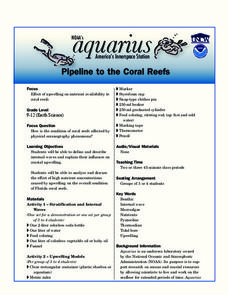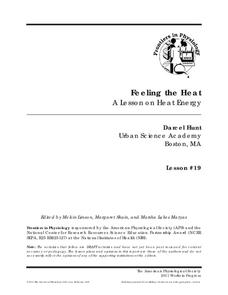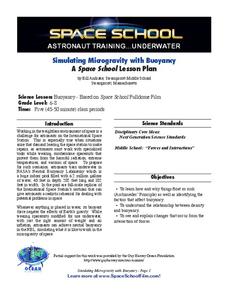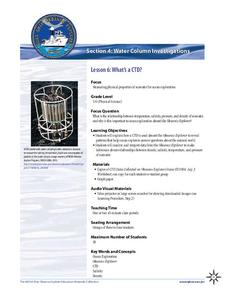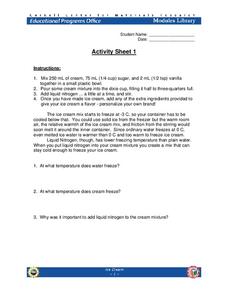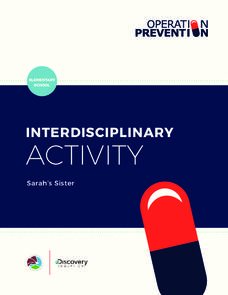Florida International University
Pipeline to the Coral Reefs
Discover firsthand the effects of internal waves on coral reefs. Through a series of experiments, learners simulate internal waves and upwelling events as they make observations on the movement of water and other debris. They then...
Florida International University
Counting FishStix
How do we count the fish in the ocean? An engaging lesson models how to estimate fish populations with observational surveys. Class members begin by studying the behavior of fish on the coral reef in the oceans. They then become the fish...
American Physiological Society
Feeling the Heat
How do the changing seasons affect the homes where we live? This question is at the forefront of engineering and design projects. Challenge your physical science class to step into the role of an architect to build a model home capable...
Prestwick House
Understanding Language: Slant, Spin, and Bias in the News
We live in a time of fake news, alternative realities, and media bias. What could be more timely than an activity that asks class members to research how different sources report the same topic in the news?
Prestwick House
Rhyme and Repetition in Poe's "Annabel Lee"
Many and many a year ago Edgar Allan Poe crafted the chilling tale of "Annabel Lee." The poem is the perfect vehicle to introduce Poe's concept of unity of effect, the idea that every element in a poem or story should help to develop a...
Prestwick House
"Because I could not stop for Death" -- Visualizing Meaning and Tone
Emily Dickinson's "Because I could not stop for Death" provides high schoolers with an opportunity to practice their critical thinking skills. They examine the images, diction, rhythm, and rhyme scheme the poet uses and consider how...
Prestwick House
Teaching Shakespeare: Sonnet 73
It's that time of year to consider how Shakespeare selects his images and structures his Sonnet 73 to develop the meaning of the poem. Class members examine the rhyme scheme, the indented lines, the conceit, and the images used in each...
Florida International University
Simulating Microgravity with Buoyancy
How do astronauts know how to live and work in a weightless environment? It doesn't come naturally! Junior physicists conduct experiments to examine the link between buoyancy and microgravity. Each activity illustrates a different aspect...
NOAA
A Day in the Life of an Ocean Explorer
What's life like aboard an ocean exploration vessel? Junior oceanographers examine the important role of communication in ocean research in lesson two of a five-part series from NOAA. The materials introduce the class to life on board...
NOAA
Wet Maps
How do oceanographers make maps under water? Junior explorers discover the technologies and processes involved in creating bathymetric maps in part three of a five-part series designed for fifth- and sixth-grade pupils. The lesson...
NOAA
Mapping the Deep-Ocean Floor
How do you create a map of the ocean floor without getting wet? Middle school oceanographers discover the process of bathymetric mapping in the third installment in a five-part series of lessons designed for seventh and eighth graders....
NOAA
What's a CTD?
Why are the properties of the water important when exploring the ocean? Young scientists discover the tools and technology used in deep sea exploration in the fourth installment in a five-part series. Groups work together to examine...
NOAA
The Oceanographic Yo-yo
How does chemistry help deep-sea explorers? Part four of a five-part series of lessons from aboard the Okeanos Explorer introduces middle school scientists to technologies used in ocean exploration. Groups work together to analyze data...
NOAA
A Quest for Anomalies
Sometimes scientists learn more from unexpected findings than from routine analysis! Junior oceanographers dive deep to explore hydrothermal vent communities in the fourth lesson in a series of five. Scholars examine data and look for...
NOAA
Invent a Robot!
Wait til your class gets their hands on this! Aspiring engineers design a working robotic arm in the fifth and final installment in a series of ocean exploration lessons. Pupils learn about the use of underwater robots in ocean...
NOAA
Through Robot Eyes
How do robots assist ocean explorers in collecting data and images? The final installment in a five-part series has science scholars examine underwater images collected by robots and identify the organisms shown. Groups then calculate...
Towson University
Looking Backwards, Looking Forward
How do scientists know what Earth's climate was like millions of years ago? Young environmental scholars discover how researchers used proxy data to determine the conditions present before written record. Grouped pupils gain experience...
Cornell University
Isotopes
What better way is there to learn about isotopes than to play with them? Chemistry students manipulate the number of protons and neutrons in a hands-on activity. Individuals try to score the largest number of points by collecting the...
Discovery Education
Our Brain and Body on Opioids
Use a presentation that explores the world of prescription opioids. Learners look at the way the brain responds to the drugs and the long terms effects opioids have on the brain and body. At the end of the lesson plan, groups create a...
Discovery Education
Sarah's Sister
Does it matter where medication is stored in your home? Absolutely. The best way to identify proper and improper storage of medications is to participate in different role-play scenarios. A lesson plan models the safe storage of...
PBS
Stories of Painkiller Addiction: The Brain on Autopilot
For some people, the force of addiction can be as biologically compelling as the drive for food or water. High schoolers watch a video segment about Ryan, a recovering addict, and learn more about how opioids and other drugs can affect...
Discovery Education
Malachi's Medication
What's on a prescription medicine label? After learners practice measuring Malachi's prescribed dosage for his medication, they collaboratively discuss and explain why measuring it with the proper measuring tools is essential. Young...
Curated OER
Open Inquiry Using C. elegans
Ever wondered what motivates a roundworm? Introduce your biology class to C. elegans, a non-parasitic model organism that can help them understand behavioral stimuli. Paired pupils design an experiment to test the worm's reaction to...
Curated OER
Fishy Behavior
Here's a lab that may make you rethink that morning cup of coffee. Biology scholars test the effects of caffeine, alcohol, and nicotine on the behavior of zebrafish through an intriguing experiment. Learners observe fish behavior before...
Other popular searches
- Teacher Resources
- Teacher Websites
- Substitute Teacher Resources
- Teachers in Space
- Teachers Sites
- Science Teacher Resources
- Substitute Teachers
- Teacher Education
- Teacher Resources Tenses
- Teacher Appreciation
- Math Teacher Resources
- Student Teacher


